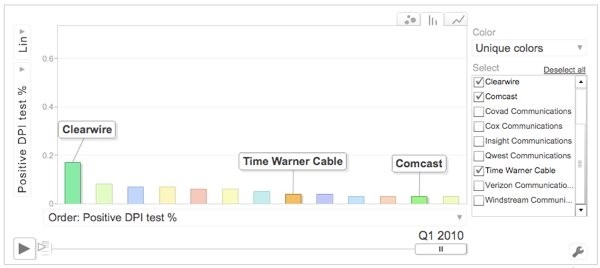Back in 2009 Google and a group of partners formed the Measurement Lab, an open project of distributed servers meant to help researchers gauge just how well an internet connection is working and help customers determine if their ISP is blocking or throttling particular applications. Though we haven't heard from them in a while, this week the group has posted an interesting data set that highlights the evolution of ISP throttling in a number of countries.
The study in question includes BitTorrent throttling percentages of ISPs in dozens of countries spanning the two-year period between April 2008 and May 2010. TorrentFreak reported on the findings and noted how Comcast, who was throttling nearly half of all P2P traffic a few years ago, last year only throttled around 3% of such connections running on their network. The company implemented a more intelligent network management system by the end of 2008 after they were found using dubious tactics to halt P2P traffic, violating FCC rules for reasonable network management.

Cox also went from 51% to 3% in the same time period, while Clearwire remained the only U.S. Internet provider that limited more than 10% of all BitTorrent traffic up until the fist quarter of 2010, slowing 17% of all torrent transfers.
Canada's Rogers was the worst offender worldwide, throttling 78% of BitTorrent connections at the end of the study. On the other side of the pond, Tiscali and BT Group were found to throttle 27% of BitTorrent connections in the U.K, Germany's Kabel slowed 36% of traffic, while Bouygues Telecom was the least torrent friendly in France at just 8%.
Check out the full dataset as well as some interactive graphs here. The Measurement Lab promised to release more recent data in the future, so users can make an informed decision when shopping between ISPs.